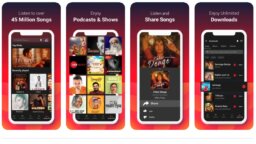There’s been a major development in the music streaming landscape in India.
Spotify rival Gaana, which announced in August that it had surpassed 185m monthly active users, has just raised 3.75bn INR (approximately $51m) in debt to help finance its growth.
The money comes from two existing Gaana investors – Tencent, and the platform’s majority-owner Times Internet – in the form of optionally converted debentures at a price of 63,761.93 INR (around $870) per share.
The majority of this cash (approximately $41m) has been handed over by Tencent’s European entity, Tencent Cloud BV, with the remaining amount coming from Times Internet.
According to financial filings in India, the move has seen Tencent’s ownership stake in Gaana increase to 34.44%, while diluting Times Internet’s stake to 60.18%. The third stakeholder in Gaana, ESOP Pool, owns 5.38%.
Entrackr estimates that, as a result of the new debt raise, Gaana is now worth around $530m – with Times Internet’s stake worth $319m, and Tencent’s stake worth $182.5m.
Tencent initially acquired a stake in Gaana via a $115m investment in the company in February 2018.
Running back through the highlights of Tencent’s music / entertainment business portfolio is always fun, so here’s a quick update.
Via Tencent Holdings and its subsidiaries (including majority-owned Tencent Music), Tencent now owns assets including:
- 10% of Universal Music Group;
- 1.6% of Warner Music Group;
- 9.1% of Spotify (which owns a reciprocal, similar-sized stake in Tencent Music Entertainment);
- 34% of Gaana;
- Around 40% of Epic Games, maker of Fortnite;
- 100% of Riot Games, maker of League Of Legends, which recently announced new partnerships with partially-Tencent-owned Universal Music Group… and partially-Tencent-owned Spotify.
The list goes on.
As for Gaana, the service had a big month in August: not only did it announce that 185m user milestone, but the company’s CEO, Prashan Agarwal predicted that the platform would be able to “onboard 250 million new users in the next 12 months”.
This is some ambition: if fulfilled, it would take Gaana’s reported monthly active user base to 435m.
That would be far ahead of Spotify’s global active user count today, which stood at 299m as of the end of Q2. In other words, it would almost certainly make Gaana the world’s biggest on-demand audio streaming platform by user count.
In a crucial addition to its user acquisition strategy, Gaana introduced short-form user-generated video to its service via new brand HotShots last month, a clear attempt to fill the void in India left by the exodus of TikTok.
“Over the years, we have been relentless in our focus on consumer-centricity & foresight on product innovation… We believe [we can] onboard 250m new users in the next 12 months.”
Prashan Agarwal, Gaana (speaking in August)
To quote Gaana CEO Prashan Agarwal in full from last month, he said: “Over the years, we have been relentless in our focus on consumer-centricity & foresight on product innovation. As one the biggest home-grown digital entertainment platforms in the past decade, we have invested heavily in building a comprehensive multilingual content library, and a solid AI-led technological foundation that makes content discovery and access convenient and enjoyable for every Indian.
“Currently, 80% of all Gaana users are loyalists, i.e. they love the idea of being able to access songs, podcasts and short videos from their favorite artists in a single integrated experience. We believe this ability to deliver a strong value to entertainment-lovers will help us onboard 250m new users in the next 12 months.”
Bytedance-owned TikTok is still banned in India, following a decision by India’s government, driven by growing geo-political tensions, to blacklist the app in June.
Other Chinese-owned apps have also been banned on India app stores, including (interestingly) Tencent-owned products such as QQ Music.
Gaana’s biggest rivals in India include Spotify and Jiosaavn. The latter last month announced that it was integrating US-based TikTok rival Triller into its service in India.
A press release claimed that deal would “growth and subscribers for both services”.
Jiosaavn’s user base exceeded 100m in Q2 last year, MBW discovered, and is expected to have grown significantly since.Music Business Worldwide




